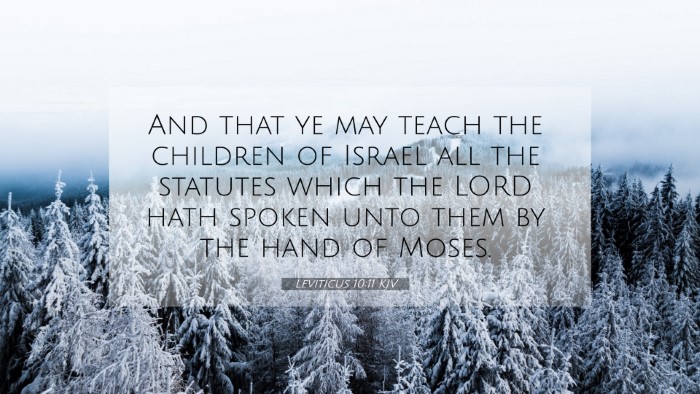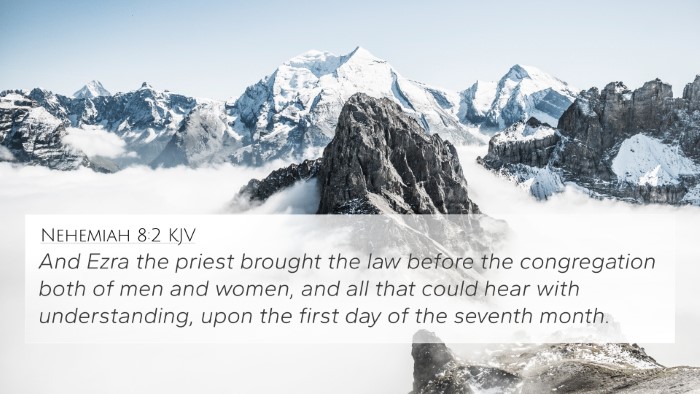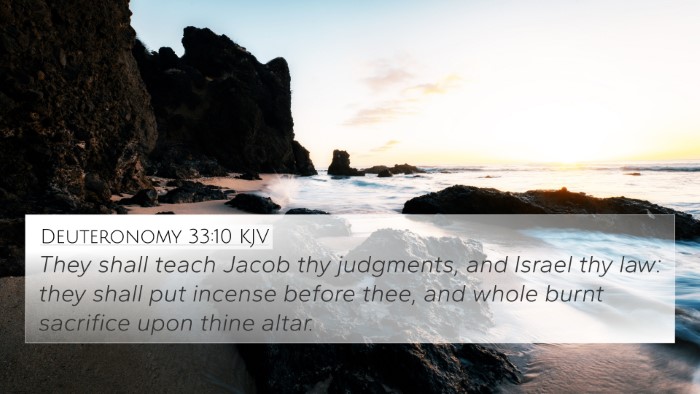Understanding Leviticus 10:11
Leviticus 10:11 states, "And that you may teach the children of Israel all the statutes which the Lord has spoken to them by the hand of Moses." This verse emphasizes the importance of teaching God's laws and commands to the people of Israel. Below, we explore its meaning through insights from various public domain commentaries, including those of Matthew Henry, Albert Barnes, and Adam Clarke.
Verse Context and Significance
This passage occurs shortly after a tragic event where Aaron’s sons, Nadab and Abihu, are consumed by fire for offering unauthorized incense before the Lord. The immediacy of this command reminds the Israelites of the strict requirements of God's holiness and proper worship.
Insights from Commentaries
-
Matthew Henry:
Henry explains that this command was given to Aaron, emphasizing the vital role of priests in instructing the people. He highlights that knowledge of God's laws is essential for proper worship and obedience.
-
Albert Barnes:
Barnes notes that the directives given through Moses were not merely religious rites but essential to the national and spiritual identity of Israel. Teaching these laws is seen as critical to maintaining divine favor and community order.
-
Adam Clarke:
Clarke elaborates on the necessity of understanding the statutes, stating that the priests are responsible for ensuring that the teachings reflect God’s intentions accurately. He stresses the idea that this education must be part of the daily life and practice of the Israelites.
Cross-References to Leviticus 10:11
This verse connects with several other biblical scriptures that discuss God's statutes, the role of priests, and the importance of teaching God’s laws:
- Exodus 18:20: "And you shall teach them the statutes and the laws, and show them the way in which they must walk and the work they must do." This verse speaks to the responsibility of leaders to teach God's laws.
- Deuteronomy 6:7: "You shall teach them diligently to your children, and shall talk of them when you sit in your house, and when you walk by the way, and when you lie down, and when you rise." This reinforces the commitment to instill God's laws in future generations.
- Malachi 2:7: "For the lips of a priest should keep knowledge, and people should seek the law from his mouth; for he is the messenger of the Lord of hosts." This verse highlights the priest's role in teaching and maintaining the knowledge of God's laws.
- Psalms 119:66: "Teach me good judgment and knowledge, for I believe your commandments." This shows the desire for understanding God’s statutes as foundational to faith.
- Romans 10:14: "How then shall they call on Him in whom they have not believed? And how shall they believe in Him of whom they have not heard? And how shall they hear without a preacher?" Here, the importance of proclamation and teaching the Gospel parallels the teaching of God’s commandments.
- 1 Timothy 4:13: "Till I come, give attention to reading, to exhortation, to doctrine." This verse reflects the ongoing responsibility of believers to teach and preserve sound doctrine.
- Titus 2:1: "But as for you, speak the things which are proper for sound doctrine." This verse echoes the importance of sound teaching within the church, linking the concept of teaching across the biblical narrative.
- Hebrews 5:12: "For though by this time you ought to be teachers, you need someone to teach you again the first principles of the oracles of God." This highlights the expectation of growth in understanding God’s word.
- Matthew 28:19-20: "Go therefore and make disciples of all nations, baptizing them in the name of the Father and of the Son and of the Holy Spirit, teaching them to observe all that I have commanded you." This mandate from Jesus underscores the continuity of the teaching mission seen in Leviticus 10:11.
Connections Between Bible Verses
The thematic connections present in this verse and its cross-references highlight the continuity of God’s commandments from the Old Testament to the New Testament.
By examining these scriptures, we see a comprehensive biblical framework that emphasizes the significance of teaching and the transmission of divine knowledge across generations.
This practice is crucial not just within the Israelite community but also in the Christian context, where the spreading of the Gospel and discipleship mirrors the role established in Leviticus 10:11.
Tools for Bible Cross-Referencing
To effectively engage in cross-referencing biblical texts, one might consider using various tools:
- Bible Concordance: This tool helps locate specific words and their corresponding verses throughout the Bible.
- Bible Cross-Reference Guide: These guides provide pre-established links between verses across both Testaments.
- Cross-Reference Bible Study: Engaging in study methods that focus specifically on interconnecting verses can deepen understanding.
- Bible Reference Resources: Utilizing dictionaries and encyclopedias can further enhance comprehensive study.
- Bible Chain References: These allow for tracing themes or topics throughout different books of the Bible.
Conclusion
Leviticus 10:11 serves as a critical reminder of the imperative to teach and embrace God’s laws and commands. The call to share these teachings remains relevant, forming a bridge through which believers understand both the Old and New Testaments and their interconnectedness.
In doing so, the continuity of God's message is preserved and passed on, reinforcing the importance of scriptural cross-referencing in biblical study.
Final Thoughts
As we reflect upon Leviticus 10:11, it is clear that the command to teach God's statutes transcends time and context. It urges us to uphold the integrity of God’s teachings, ensuring that they are cherished, understood, and communicated with sincerity and diligence.















